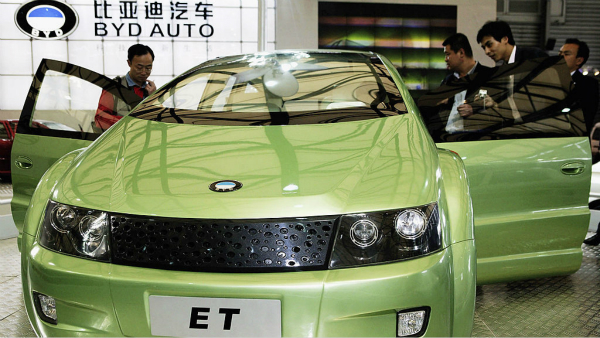China’s largest maker of battery-powered cars is lobbying for a ban on combustion engines in its home country, saying on Thursday that China’s vehicle market will be fully electric by 2030.
中国最大电动车制造商正在游说政府在国内禁用内燃发动机,其在周四表示,到2030年中国汽车市场将全面电动化。
“For China it’s most urgent to develop new energy vehicles (NEVs) and determine a timetable to completely ban gasoline vehicles,” said Wang Chuanfu, founder and chairman of BYD.
“发展新能源汽车、停止燃油车的生产和销售对中国来说可能更迫切。”比亚迪(BYD)创始人和董事长王传福表示。
Mr Wang told press gathered in the company’s headquarters in Shenzhen that China’s government was committed to moving away from combustion engines to cut pollution and minimise the country’s dependence on foreign oil.
王传福向汇聚该公司深圳总部的记者们表示,中国政府致力于淘汰内燃发动机,以减少污染,并且最小化中国对进口石油的依赖。
By 2020, buses in China would all be electrified, he said, while all heavy trucks would be electric by 2025. “By 2030, I believe China will be fully electrified, including all passenger cars,” he said, adding that government policies would shape consumer behaviour.
他表示,到2020年,中国的大巴、公交将全部电动化,而所有重型卡车将最迟在2025年电动化。“到2030年,我相信中国的私家车将全面电动化。”他表示。他还说,政府政策将会塑造消费者行为。
“This is not only because of environmental pollution and traffic congestion issues — the most urgent reason is China’s oil safety and security. China will run out of oil soon,” Mr Wang said.
王传福表示,这不仅是因为环境污染和交通拥堵问题——最迫切的原因是中国的石油安全和能源安全。中国的石油资源很快就会枯竭。
Earlier this month, China’s vice-minister of industry, Xin Guobin, said China was looking at banning combustion engines, without setting a time line for the ban. Britain and France have said they will ban traditional gasoline-powered cars by 2040.
本月初,中国工信部副部长辛国斌表示,中国正在研究禁止内燃发动机汽车的生产和销售,但没有提出任何时间表。英国和法国已宣布,到2040年将禁售传统的汽油动力汽车。
However, analysts described Mr Wang’s remarks as lobbying, and not reflective of realistic policy goals.
不过,分析师们形容王传福的言论是游说,而不反映现实的政策目标。
“If you’re the leading seller of Chinese electric vehicles then you’re going to want this to happen as soon as possible. So of course it’s logical for Wang Chuanfu to say it’s going to happen quickly,” said Bill Russo, head of Automobility, a Shanghai-based consultancy. Mr Russo added that most of China’s auto industry was not ready for full electrification.
“如果你是中国电动汽车的领先卖家,你当然希望这个局面尽快发生。所以,王传福说它很快就会发生当然是合乎逻辑的,”总部位于上海的高风咨询(Automobility)董事总经理罗威(Bill Russo)表示。他补充说,中国汽车工业的大部分还没有准备好全面电动化。

“It’s easy to set targets, it’s hard to achieve them,” he said. “I think you’re going to see a lot of lobbying on the part of Chinese companies and foreign enterprises who would prefer to keep the status quo.”
设定目标很容易,难的是实现目标,”他说,“我想你会看到大量游说,这些游说代表那些宁愿维持现状的中资和外资企业。”
Zhong Shi, a member of the expert committee of the China Automobile Dealers’ Association, said it was optimistic to expect Chinese vehicles to be fully electric by 2030. “As far as I can see, the earliest time to completely ban gasoline cars would be 2035,” said Mr Zhong.
中国汽车流通协会(China Automobile Dealers’ Association)专家委员会成员钟师表示,预期中国所有汽车到2030年完全电动化有点过于乐观。“在我看来,完全禁止汽油动力汽车的最早时间点将是2035年。”钟师表示。
The government is also on the verge of launching a carbon trading scheme that will benefit BYD, which is 8 per cent owned by Warren Buffett’s Berkshire Hathaway. Starting next year or in 2019, traditional carmakers in China will have to make a certain number of NEVs or else buy credits from NEV makers such as BYD.
中国政府还即将推出一个碳交易机制,这将有利于比亚迪;沃伦?巴菲特(Warren Buffett)的伯克希尔哈撒韦(Berkshire Hathaway)持有该公司8%股份。从明年或2019年开始,中国的传统汽车制造商将必须制造一定数量的新能源汽车,或者从比亚迪这样的新能源汽车制造商购买碳排放额度。
Mr Wang declined to speak about the timing of the scheme or how much BYD could potentially earn from carbon credits. “The carbon trading scheme will help companies to achieve a healthy growth, and BYD as the market leader will receive some benefit. But exactly how much it’s hard to say,” he said.
王传福拒绝透露该机制的时间安排,或比亚迪有望从碳排放额度斩获多少利益。他表示,碳交易计划将有助于企业实现健康增长,而比亚迪作为市场领先者将获得一定收益。但具体有多少还很难说。













